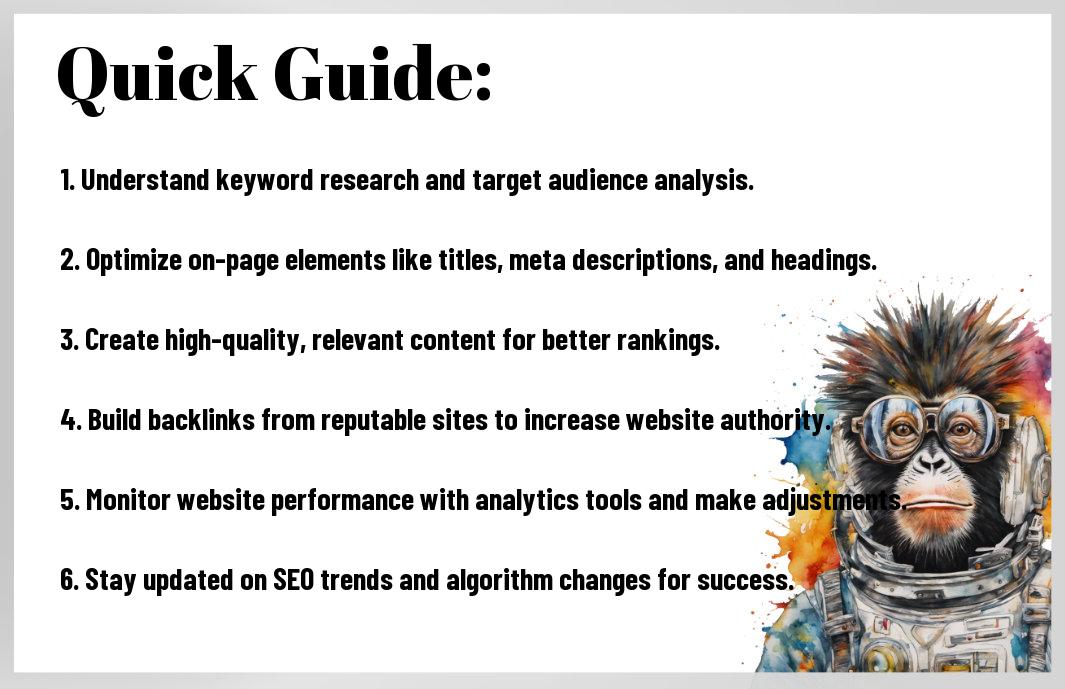You know SEO is the key to boosting your website’s visibility and driving organic traffic, but mastering it can seem like a daunting task. Fear not, as this ultimate guide from WebFX is here to demystify SEO and help you navigate through the ever-changing landscape of search engine optimization. From the importance of keyword research to on-page optimization techniques and the impact of backlinks, this comprehensive guide covers everything you need to know to optimize your website effectively. Whether you’re a beginner looking to improve your SEO knowledge or a seasoned pro seeking the latest strategies, this guide has got you covered. Get ready to take your website to the next level and dominate the search engine rankings!
Key Takeaways:
- Keyword Research: Conduct thorough keyword research to identify relevant keywords for your website content.
- On-Page Optimization: Implement on-page SEO techniques such as optimizing meta tags, headers, and content for search engines.
- Link Building: Develop a strong backlink profile by obtaining high-quality inbound links from authoritative websites.


Understanding SEO
Clearly, SEO (Search Engine Optimization) is a crucial aspect of creating a successful online presence. By optimizing your website for search engines, you can increase visibility, drive organic traffic, and ultimately improve your website’s performance.
Types of SEO: On-Page, Off-Page, and Technical
While understanding the different types of SEO is necessary for mastering your website’s optimization, it’s crucial to recognize the distinctions between On-Page SEO, Off-Page SEO, and Technical SEO. Each plays a vital role in improving your website’s search engine rankings.
| On-Page SEO | Off-Page SEO |
| Optimizing content and HTML source code | Building backlinks from authoritative websites |
| Targeting keywords and optimizing meta tags | Increasing online presence through social media |
| Improving website speed and user experience | Guest blogging and influencer partnerships |
| Mobile-friendliness and responsive design | Online reviews and reputation management |
| Optimizing images and multimedia content | Local SEO strategies for geographic targeting |
Key Ranking Factors for SEO
Ranking high on search engine results pages requires a deep understanding of the key ranking factors that influence your website’s visibility. By focusing on content quality, backlinks, mobile-friendliness, site speed, and user experience, you can enhance your SEO efforts and drive more organic traffic to your website. Thou must prioritize these factors to achieve optimal results.
Ranking high on search engines involves a combination of several factors, including content relevance, domain authority, social signals, link quality, and user engagement. Thou must continuously monitor and optimize these elements to stay ahead in the competitive online landscape.
Off-page SEO tactics such as building high-quality backlinks from reputable websites, earning positive online reviews, and leveraging social media signals can significantly impact your website’s search engine rankings. It’s imperative to prioritize these off-page SEO strategies to establish authority and credibility in your industry.
Step-by-Step SEO Strategies
After Learn SEO | Resource Library, let’s look into a comprehensive guide on mastering SEO for your website.
| Developing a Keyword Strategy | Content Optimization Tips |
Developing a Keyword Strategy
On your journey to mastering SEO, developing a solid keyword strategy is crucial. Start by researching relevant keywords that align with your content and target audience. Utilize tools like Google Keyword Planner to identify high-volume, low-competition keywords that you can incorporate into your website content to improve search engine rankings.
Content Optimization Tips
One key aspect of SEO is optimizing your content for search engines. Ensure your main keywords are strategically placed in your titles, meta descriptions, headings, and throughout the body of your content. Additionally, focus on creating high-quality, informative content that addresses the needs and interests of your target audience. Knowing how to effectively optimize your content can significantly boost your website’s visibility and organic traffic.
A more in-depth exploration of content optimization includes:
- Keyword Placement: Strategically placing keywords in key areas of your content.
- Quality Content: Creating valuable and engaging content that resonates with your target audience.
- Internal Linking: Linking related content within your website to improve navigation and user experience.
Knowing how to effectively optimize your content can make a significant impact on your website’s search engine rankings and overall online visibility.
Advanced SEO Techniques
- Structured Data and Schema Markup
- Link Building Strategies: What Works and What Doesn’t
Structured Data and Schema Markup: Pros and Cons
| Pros | Cons |
| Enhances search results appearance | Can be time-consuming to implement |
| Helps search engines understand your content better | Not all types of structured data are supported by search engines |
| Improves click-through rates | Requires technical knowledge to implement correctly |
Structured Data and Schema Markup: In the context of SEO, implementing structured data and schema markup can have its pros and cons. While it enhances the appearance of search results and helps search engines better understand your content, it can be time-consuming to implement and requires technical knowledge. Additionally, not all types of structured data are supported by search engines, so it’s imperative to weigh the benefits against the potential challenges.
Link Building Strategies: What Works and What Doesn’t
Link Building Strategies: What Works and What Doesn’t Link building is a crucial aspect of SEO, but not all strategies are created equal. The key to successful link building lies in quality over quantity. The practice of buying links or engaging in link schemes can lead to penalization from search engines. On the other hand, building high-quality, relevant backlinks from authoritative websites can significantly boost your site’s credibility and improve your search rankings.
Keep Mastering SEO: The Ultimate Guide To Mastering SEO For Your Website
Tools for Monitoring SEO Performance
Measuring and tracking your SEO success is important to ensure your efforts are paying off. Using tools like Google Analytics, SEMrush, Ahrefs, and Moz can provide you with valuable insights into your website’s performance. These tools can help you track keyword rankings, organic traffic, backlinks, and more to fine-tune your SEO strategy for optimal results.
Adapting Your Strategy Based on Analytics
For Mastering SEO: The Ultimate Guide to Search Engine Optimization for Your Website, it’s crucial to analyze the data provided by these tools and make informed decisions for your SEO strategy. By monitoring metrics such as bounce rate, conversion rate, and pages per session, you can identify strengths and weaknesses in your current approach. Adapting your strategy based on analytics will help you stay ahead in the ever-evolving world of SEO and ensure long-term success for your website.
Summing up
Following this comprehensive guide from WebFX, mastering SEO for your website is achievable. By understanding the importance of search engine optimization, conducting thorough keyword research, optimizing on-page and off-page elements, and leveraging analytics, your website can significantly improve its visibility and ranking in search engine results. With the right strategies and continual effort, you can enhance your website’s SEO performance and drive more organic traffic to your site, ultimately leading to increased brand awareness and potential revenue growth.
FAQ
Q: What is SEO?
A: SEO stands for Search Engine Optimization. It’s the practice of increasing the quantity and quality of traffic to your website through organic search engine results.
Q: Why is SEO important for my website?
A: SEO is crucial for your website because it helps search engines understand what your site is about and whether it is relevant to users. By optimizing your website, you can improve your visibility online, drive more traffic to your site, and ultimately increase your revenue.
Q: How can I master SEO for my website?
A: To master SEO for your website, you need to focus on creating high-quality content, optimizing your website for keywords, improving your site’s user experience, and building high-quality backlinks. It’s important to stay updated on the latest SEO trends and algorithms to ensure your website stays competitive in search engine rankings.
